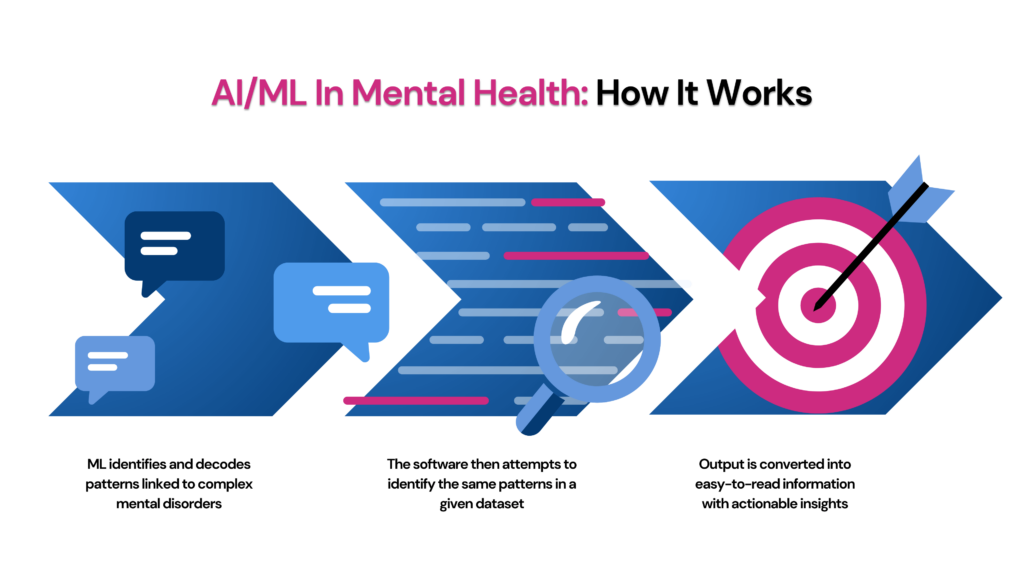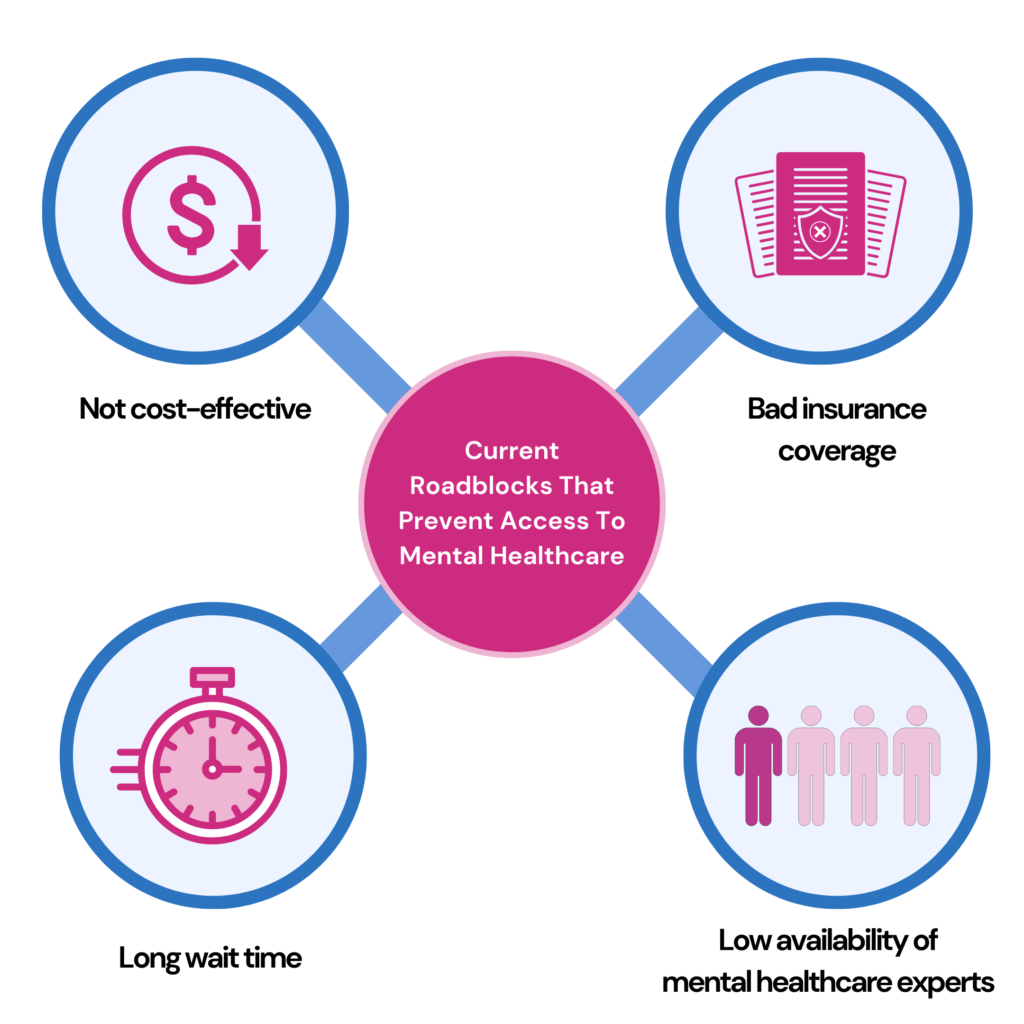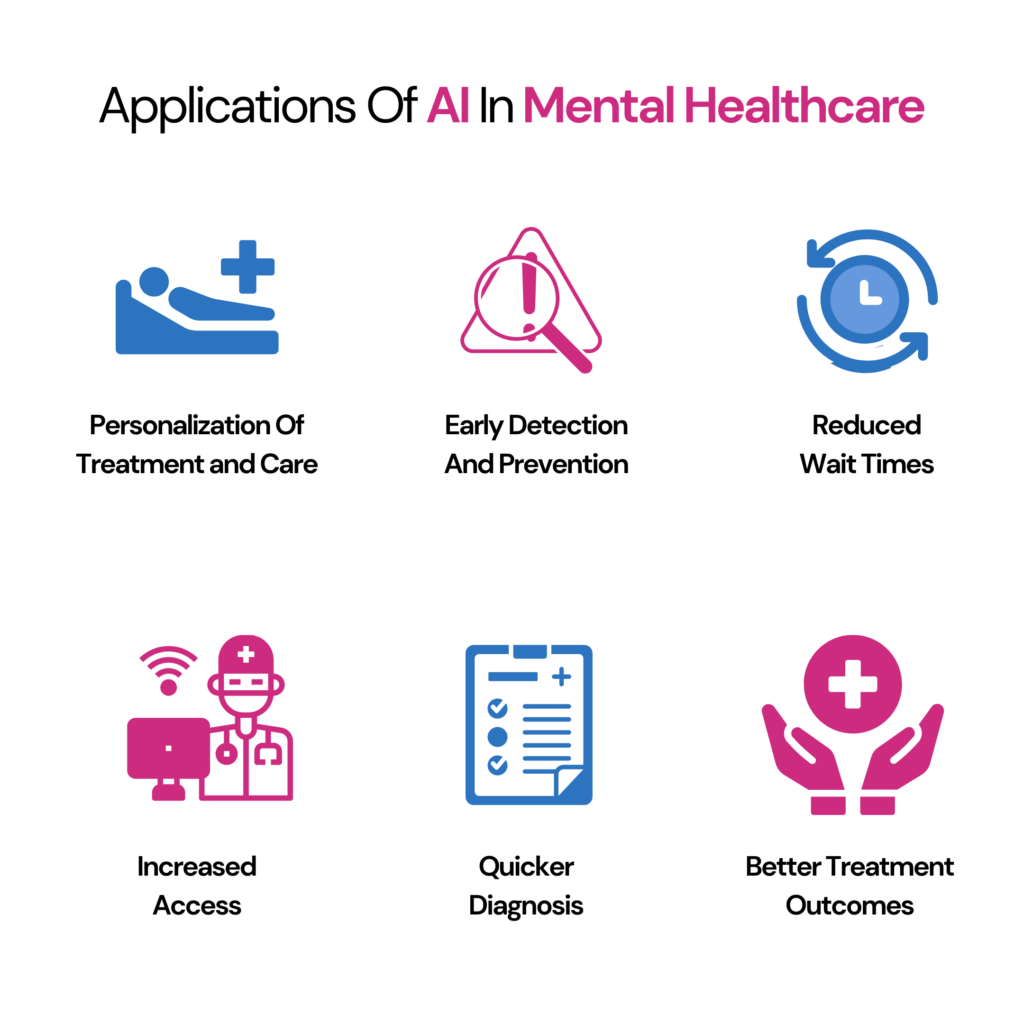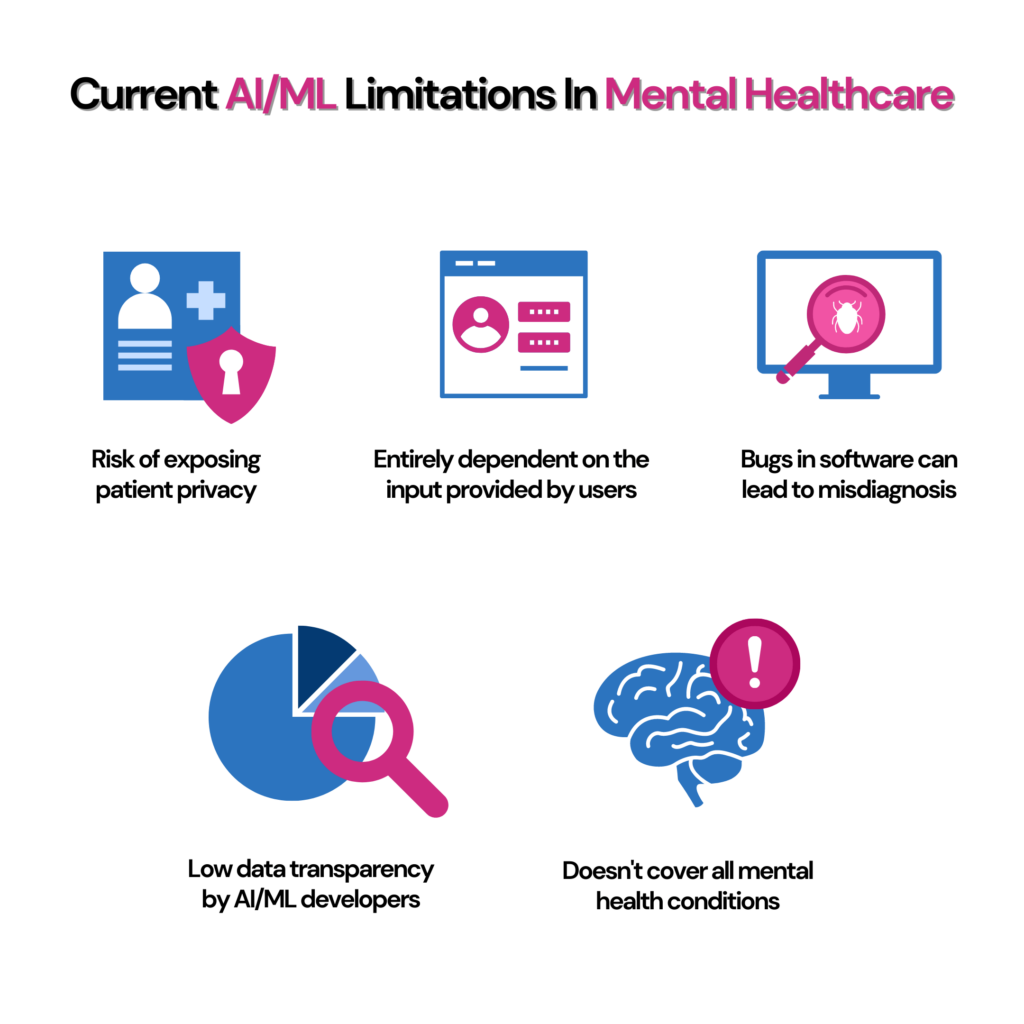Artificial Intelligence (AI) is creating its mark in different healthcare segments, including mental health.
The mental health space is growing exponentially, with a greater need for mental health experts.
According to a report by Mental Health America, as of 2023, there is just one mental health expert for about 350 people in need.
This leads to experts not being able to help everyone in need.
As a result, therapists are turning to AI to handle some of their existing workloads.
Though AI is not a fully established technology in the mental health space, experts believe that AI in mental health has an enormous potential that needs to be explored.
Uses Of AI In Healthcare
AI is not a new concept in the healthcare industry.
Several biotechnology and pharmaceutical companies already use AI for disease detection and progression, optimizing drug dosages, and drug discovery.
AI includes concepts like pattern recognition, rapid pattern analysis, neural networks, and deep learning.
All these can be used in different healthcare fields, including oncology, radiology, and ophthalmology, to offer precise diagnoses and effective treatments.
AI is currently being explored as a supportive technology to base clinical decisions on.
The ability of AI to recognize patterns from billions of data, process information at high speed, and synthesize information from immense amounts of past medical information all make AI a preferred technology of choice in healthcare.
Here are some examples of AI used in healthcare.
- The atomnet model is an AI tool designed and used by a pharmaceutical company called Atomwise. The tools help their drug discovery process by identifying small molecule drugs, screening trillions of compounds, eliminating unlikely leads, and making accurate predictions.
- Surgeons at the Maastricht University Medical Center, Netherlands, used AI-based robots to assist them in surgery. These robots could successfully suture very minute blood vessels (sized 0.03 to 0.08 mm).
- Intel, a technology company, has partnered with Scripps Research Institute to create a deep learning algorithm that could detect cardiovascular risks in 23 patients that traditional statistical methods missed.
Why Is There A Need For AI In Mental Health?
Mental health disorders are on the rise right now.
In 2021, 57.8 million American adults were diagnosed with mental health disorders.
Experts say this number could be much higher as many individuals don’t get professional help.
The following are some problems with the traditional mental health treatment setups.
- Seeing a mental health expert can be expensive.
- Bad insurance coverage for mental health treatment.
- Long wait time for appointments.
- Low availability of mental healthcare experts
AI in mental health may reduce the cost of getting treated and ensure everyone in need gets help quickly.
AI may also be used to precisely identify problems and customize drug doses and treatment options based on various parameters like environmental, genetic, and behavioral patterns.
Current AI Applications In Mental Health
Here are some current AI applications in mental health.
Digital Therapeutics
Digital therapeutics (DTx) is a process of offering therapeutic interventions and medical solutions driven by artificial intelligence.
Such interventions can treat, prevent, or manage a health condition.
Experts suggest the DTx industry could be valued at $56 billion by 2025.
Psychiatry is an important segment of the healthcare industry, where a pipeline of academic and industry DTx research has been happening in the last decade.
Some of the ongoing DTx projects in the mental health space are:
- Abilify MyCite - treatment options for schizophrenia, depression, and bipolar disorders.
- Livongo for Behavioral Health - managing and treating about 15 mental health conditions, including depression, anxiety, and insomnia.
Here is a list of the pros and cons of using DTx.
| Pros of DTx | Cons of DTx |
| Minimizes administrative time | May compromise patient privacy |
| Continuous monitoring | May increase the risk of legal liabilities for DTx brands |
| Helps reduce treatment costs | Unintentional bugs in the AI program may compromise the safety of patients |
Chatbots and Virtual Assistants
A virtual assistant is a tool that can interact digitally with patients, get relevant information, and help them reach the right experts for help.
Virtual assistants can make telemental health quick and hassle-free.
They can take over the initial administrative services and keep all data ready so that the patients can get help immediately.
How chatbots work
Chatbots, also called therapy bots, can chat with patients and offer help for various mental health issues.
Plenty of such chatbots and apps have been targeting AI-based therapy in the past, and a few of them have succeeded too.
Some examples of chatbot-based AI in the mental health space include Youper, Wyse, and Woebot.
Pros and cons of using chatbots
| Pros of chatbots | Cons of chatbots |
| Available to talk 24X7 and not bound by appointments | The conversation is only as effective as the information fed by the user |
| Affordable therapy | Bots may be unable to read inside the lines and identify issues the user doesn’t clearly state or understand themselves |
| Non-judgemental space to talk | Risk of exposing patient privacy |
Predictive analytics
Predictive analytics predicts patterns and trends based on past healthcare data.
Using predictive analytics, healthcare experts can predict the likelihood of developing health conditions, identify risk factors, and even be able to predict pandemic and epidemic-prone diseases.
How it is used in mental health
Predictive analytics-based AI in mental healthcare can analyze trillions of past data to create trends or patterns.
These may help predict the onset of mental health conditions like addictions, depression, or anxiety based on various genetic and environmental factors.
With these predictions, mental health experts may be able to forecast health issues and offer preventive treatments.
Here is a list of the pros and cons of using predictive analytics.
| Pros of predictive analytics | Cons of predictive analytics |
| Early diagnosis | Sudden changes in variables like environment or relationships can alter the results. |
| Ability to prevent symptoms from worsening | False positives may lead to overspending |
| Ability to identify pandemic or epidemic-prone diseases early on and stay prepared |
The Promise Of AI In Mental Health

AI in mental health has abundant possibilities.
With the exponential increase in mental health disorders, there will always be an imbalance between people needing help and those available to offer the same.
AI can take over some initial therapy tasks, accelerating the speed at which people receive support.
AI in the mental health space can also improve the efficiency of treatments offered and make treatments more precise and tailor-made for the individual.
Here are some of the promises AI offers in mental health treatments.
Improving The Accuracy Of Diagnosis
One of the most significant advantages of using AI in the mental health space is the increased accuracy of diagnosis.
A peer-reviewed study published in 2020 reported that the average accuracy of diagnosis of an AI tool was 72.52%. The accuracy of human doctors in the same field was 71.4%.
Advantages: Quicker diagnosis with the same or improved accuracy.
Effective tool for second opinions for doctors.
Limitation: Errors in input can result in misdiagnosis
Personalization Of Treatment
One of AI's biggest promises in the mental health industry is personalized medicine.
The way every individual thinks and acts is determined both by their genes and the society they grow in.
That’s why the same medicine may not work for all patients.
AI-enabled personalized treatment helps take the guesswork out of drug doses and treatment options.
AI can analyze family history, genetic mutations, and past medical records to personalize mental health treatment plans.
Advantages: Lowered risk of drug overdoses
Better treatment outcomes
Limitations: High chances of failure to diagnose anomalies that don’t follow a particular pattern
May not be able to capture the entire complexity of mental health conditions
Privacy concerns
Early Detection And Prevention
Mental health conditions are easier to treat when spotted early.
AI in mental health can be used to assess the risk of developing mental health disorders and help medical experts create preventive solutions to mitigate the risk.
However, the technology is still growing in this space.
The following challenges must be targeted and worked on before accessing the benefits.
Current Challenges Of AI In Mental Healthcare
- Most AI applications and tools only focus on specific mental health conditions like depression, anxiety, and psychotic disorders. There are so many other conditions that need to be included too.
- The effectiveness of AI in mental health diagnoses depends on multiple factors, like the input data, statistical data used, and the codes generated. Problems in any of these can affect the results generated.
- Technology companies may not share the exact AI models used, which would mean sharing business secrets with competitors. As a result, transparency in the process is a current challenge to be worked on.
- Chatbots and virtual therapists may push patients into a self-help mode, which may backfire without a human expert intervening.
- Using ineffective AI applications and tools may worsen mental health symptoms.
Also Read: Genetic Testing for Mental Health
How Can Bias In AI Impact Mental Health Care?
Although computationally very powerful, experts believe that AI in mental health can be affected by different biases, just like human minds.
One of the main reasons for AI bias is that initial healthcare was only focused on specific races and genders.
As a result, historical data mining by AI tools may not deliver results representative of human diversity.
Biases concerning social statuses, genders, races, and classes may encourage these applications to change their outputs, making the whole process unfair and biased.
AI In Emergency Decision-Making: A Study
A 2022 study analyzed the effects of biased AI in emergency decision-making.
In total, 438 clinicians and 516 non-experts participated in an online experiment.
Study Details
The participants received fictitious phone calls from men with mental health emergencies.
They were instructed to call the police if they suspected the caller was violent and prone to crime or forward them to a mental health expert for more help.
They were assisted by an AI tool designed to be biased against certain races.
The participants were offered suggestions from the AI tool, and they could choose to accept or ignore the advice.
Study Results
The study reported that their decisions to call the police or the mental health expert were highly influenced by the AI tool.
Therefore, a biased AI system can affect the quality of help and lead to unfairness in the mental health space.
Ways To Mitigate Bias
- Consistent Monitoring And Evaluation Of Tools
The first way to mitigate AI bias is to constantly evaluate and monitor AI tools and spot and eliminate disparities and possible biases quickly to increase efficiency.
A 2021 study reports that the long-term solution to avoiding disparity and biases is to monitor all aspects of AI in mental health, including data collection and quality of publications regularly.
- Collecting Diverse Data
The easiest way to mitigate bias in AI is to feed it with more diverse data.
Unfortunately, many public data sets don’t represent minorities fairly.
Using these datasets will affect the quality of output generated.
- Practicing Algorithmic Hygiene
Algorithmic hygiene is the practice of regularly going back to the basics and working on identifying and eliminating different causes of bias to ensure the setup works right.
- Creating Better Regulatory Criteria
A long-term solution to making AI in mental health bias-free and dependable is to have better regulatory criteria and compliance terms in this space.
Governments and regulatory bodies need to focus on their regulatory, privacy, and data safety infrastructure and have policies to govern the process.
The Potential For AI To Revolutionize Mental Health Care
With an increase in the number of people requiring help, there is no doubt that the potential for AI in the mental health space is enormous.
AI can be used as a first-line help for patients needing support, supplement the work of actual therapists, and ensure help is available when needed.
The initial challenges and hiccups of new technology are expected and very typical.
With more research and upgradation in the tools and techniques, AI can destigmatize mental health issues for the human community.
AI can make therapy affordable and easier to access, reduce human biases and errors, and bring a deeper understanding of mental health conditions.
Summary
- With the number of people with mental health issues increasing exponentially, Artificial Intelligence (AI) is being explored as a possible solution to make mental health diagnoses and treatments accessible, easier, and affordable.
- Currently, digital therapeutics, predictive analytics, chatbots, and virtual assistants are four applications of AI in mental health that are being explored.
- AI may help improve the accuracy of diagnoses, personalize treatments, and help in early diagnoses and preventive techniques in the mental health space.
- AI bias is a possible challenge to implementing this technology. Experts are working on various techniques to mitigate AI bias and bring efficiency and accuracy to using intelligent tools and applications.
- AI can make therapy affordable and easier to access, reduce human biases and errors, and bring a deeper understanding of mental health conditions.
References
- https://www.ncbi.nlm.nih.gov/pmc/articles/PMC8873348/
- https://www.ncbi.nlm.nih.gov/pmc/articles/PMC7274446/#R8
- https://pubmed.ncbi.nlm.nih.gov/29507784/
- https://www.nimh.nih.gov/health/statistics/mental-illness
- https://www.ncbi.nlm.nih.gov/pmc/articles/PMC7342342/
- https://pubmed.ncbi.nlm.nih.gov/28588005/
- https://www.nature.com/articles/s41467-020-17419-7#Sec3
- https://www.nature.com/articles/s43856-022-00214-4
- https://www.who.int/europe/news/item/06-02-2023-artificial-intelligence-in-mental-health-research--new-who-study-on-applications-and-challenges







